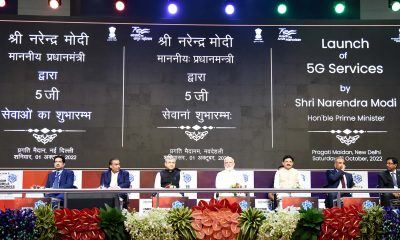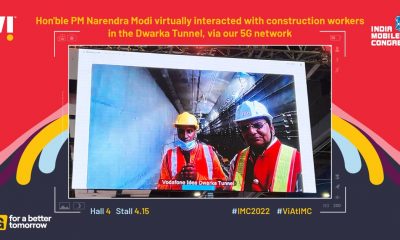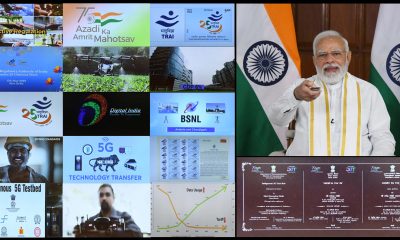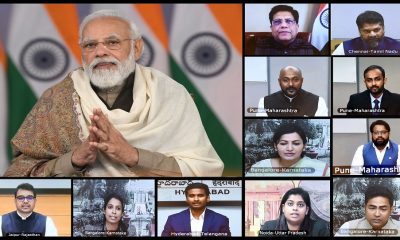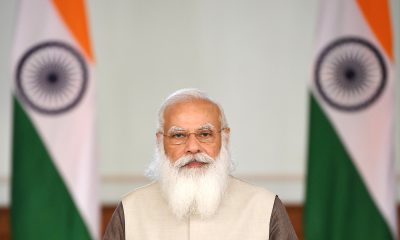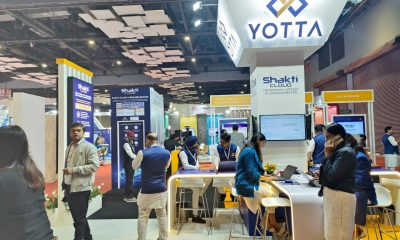News
Need for reliable connectivity for sustainable smart city

 NEW DELHI: Indian government has chalked out an ambitious USD 7.3 billion smart city mission for implementing smart solutions to improve infrastructure and service delivery across Indian cities.
NEW DELHI: Indian government has chalked out an ambitious USD 7.3 billion smart city mission for implementing smart solutions to improve infrastructure and service delivery across Indian cities.
The underlying objective is to make sure that urbanisation is not seen as a challenge, but as an opportunity.
When Prime Minister Narendra Modi had laid the roadmap for the smart city program, he had said that, “Cities in the past were built on riverbanks. They are now built along highways. But in the future, they will be built based on available optical fiber networks and next-generation infrastructure.”
Bharat Exhibitions organised the 4th edition of National Summit on 100 Smart Cities India 2018 and the theme of this event was ‘Roadmap for Innovations, Sustainability, Surveillance and Development for smart Cities’. The main objective of the forum was to explore various aspects of infrastructure that needs to be planned, designed, built and operated in order to provide the ‘Smart’ attribute to a city development. There were also conversations around the key challenges that are being faced in the implementation of smart cities.
Chetan Hebbalae, Senior Director of Product Management, Cambium Networks said, “Traffic control, public Wi-Fi, increased public safety through video surveillance, and increased efficiency for municipal services are the cornerstones of any smart city initiative. Each of these requires reliable connectivity to reach control systems, access points, cameras and sensors in dense urban environments. Wireless broadband is a proven cost effective solution that can be rapidly deployed to provide an affordable infrastructure to enable these applications.”
Shubha N. Bhambani, PGM (C&M), Bharat Sanchar Nigam Limited said, “Smart city initiatives provide catalyst for urban communities to become more resilient and sustainable. BSNL has a strong focus towards smart cities and is constantly developing new cost efficient and indigenous smart solutions.”
While we keep talking about what will be the enablers for Smart City and the challenges we are facing, NSN Murty, Partner & Leader (Smart Cities), PwC brought the attention to the fact that it is actually the citizens that have voted for it and asked for it. “It is the first, world’s largest competitive exercise by means of which these cities have been selected.” He also touched upon how the intend has now moved from the centre to state. “It is always a central government initiative but now there is an increased interest at the city level.”
Rajan S. Mathews, Director General, Cellular Operators Association of India agreed that the intend was there and said, “To realise the vision of Smart Cities the government and the industry has to come together along with all of its subsidiaries to put forth a cohesive effort.”
While the intend is certainly there, the adoption may not be happening at a similar pace. To elaborate the same Vineet Kshirsagar, Director for Government Business, NetApp Marketing & Services Pvt. Ltd., spoke on how the digital transactions were still very low.
He added, “The role is ICT is very critical in this sphere. When it comes to ICT, data is extremely critical. We are participating in many smart cities and going forward we know that there will be a lot of data that will be generated. So there is clearly a need to make a data fabric for smart cities.”
During the course of the conference, Sunil Joshi, President, Business Operations, GIFT City gave the delegates a glimpse of the kind of work that has been happening in this sphere in GIFT City. He mentioned, “GIFT provides a business platform and it is the first operational Smart City and IFSC, which is generating large number of employment opportunities in the region.”
Taking the conversation to the next level, Shri Ashutosh Vasaht, Director (POM), RailTel Corporation of India Ltd. said, talked about making smart cities sustainable. “Every business makes sense only till the time it is sustainable and every penny of the taxpayers’ money that is being spent should be accounted for.”
Vinit Goenka, Member of Governing Council and CRIS, Ministry of Railways and Member Taskforce IT, Ministry of Road, Transport & Highways and Shipping, Govt of India, said, “While answering why do we need smart cities, we should address the three Es. Whether it is Ethical? Are we being Environment friendly and lastly if it is economical? It has to have some economical gain.”
Apart from sustainability, there were other challenges such as data protection, surveillance etc. were also touched upon in the forum. National Summit on 100 Smart Cities India 2018 was sponsored by Bharat Sanchar Nigam Limited, NetApp, CSG, Cambium Networks, Savitri Telecom Services, Secura, Amdocs Optima, AMNEX, Qognify, Height8 Technologies, LigoWave and Sensorise. The event was supported by CEN, CENELEC, ETSI, COAI, TAIPA and WiFi SPFI and the Knowledge Partner was Broadband India Forum.
News
Yotta’s Cloud Data Center in GIFT City, Gujarat goes live
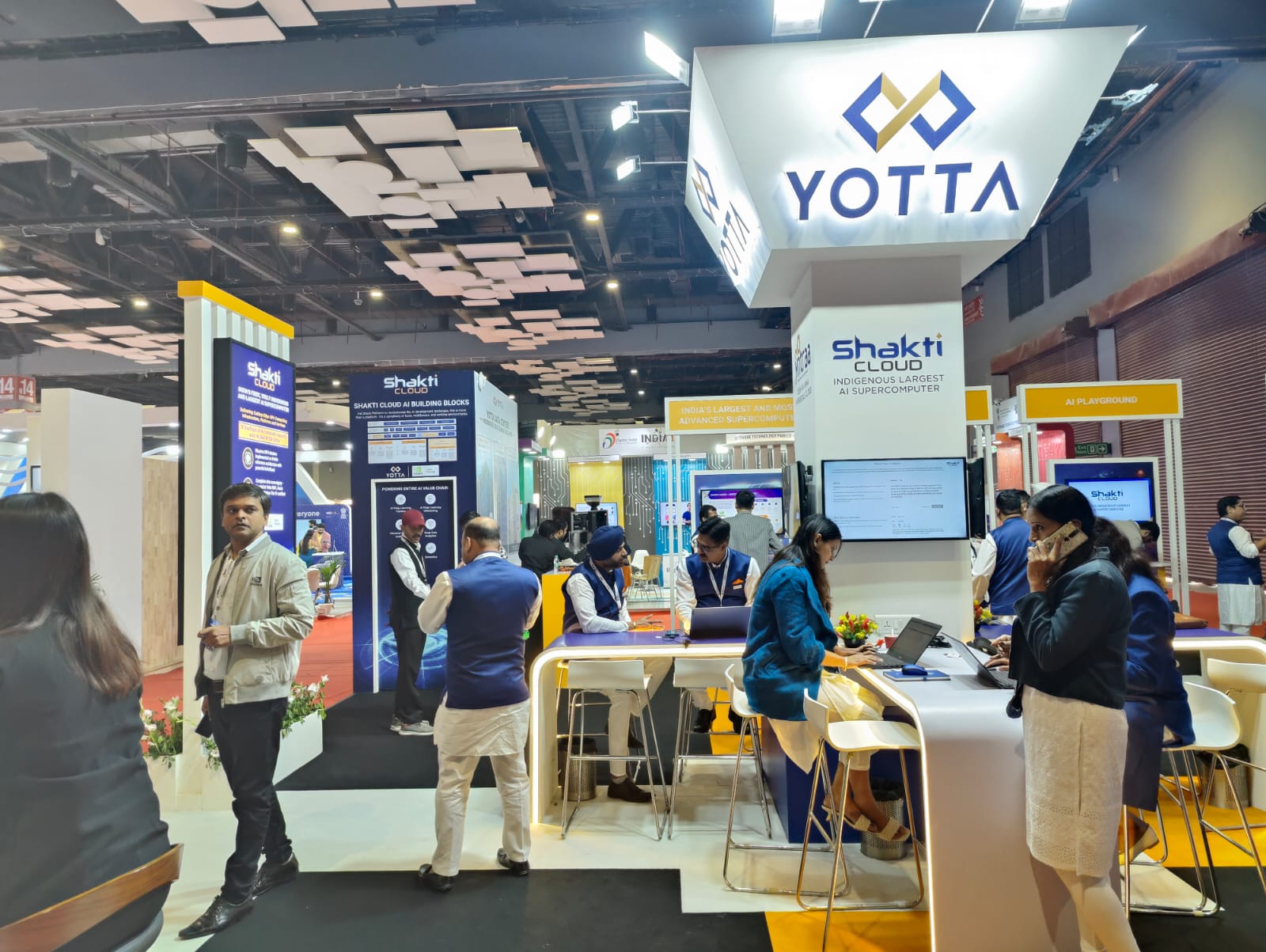
NEW DELHI: Yotta Data Services, an end-to-end Digital Transformation service provider, has announced that its state-of-the-art data centre facility, “Yotta G1”, located in GIFT city, Gandhinagar is ready for service (RFS).
The opening of this data center marks the debut of Yotta in Gujarat and progresses the company’s mission to provide digital services in India’s high-growth markets.
G1 is Yotta’s fifth data center facility in the country. It joins four large operational data centers, two of which, at Navi Mumbai and Greater Noida are part of hyperscale campuses. Yotta G1 is uniquely located inside the International Financial Services Center (IFSC) zone of Gandhinagar’s Gujarat International Finance Tec-City (GIFT city).
G1 represents an investment of more than INR 500 cr. over five years across critical non-IT and IT / Cloud / AI compute infrastructure. The data center has a capacity of over 350 high-density racks and 2 MW power (which can be scaled further as per demand). The facility is designed to meet the most demanding digital needs of its customers, who may be located within GIFT City or anywhere in the world, by seamlessly delivering fault-tolerant facility infrastructure, high-performance Cloud compute and storage infrastructure, advanced physical and cyber security, unmatched connectivity, and steadfast sustainability.
For large global enterprises operating in the GIFT City IFSC zone, the G1 data center functions as a potential data embassy, whereby their data stored is subject to the laws and regulations of their home country, thus allowing them to maintain sovereignty over their data, even when stored in India. By storing data in a physically different location, global enterprises can ensure continuity of operations in case of major disruptions within their borders. The data center’s location also ensures compliance with the IFSC regulations, providing businesses in the zone with distinct advantages like free foreign exchange convertibility, a liberalised regulatory environment, and business-friendly policies. It also helps enterprises adhere to IFSC’s compliance requirements, including being mandated to host their data within the IFSC zone.
Commenting on the announcement, Darshan Hiranandani, Co-founder and Chairman, Yotta Data Services, said, “The state of Gujarat, with GIFT City, has been at the forefront of providing a viable and sustainable platform for global businesses to set up base in India. The setting up of the IFSC zone is a further testament to their vision for financial services companies. We are proud to support this vision of the Gujarat government with a state-of-the-art data center within the IFSC zone, providing the latest and best in cutting-edge technologies to help businesses set up and scale their businesses while also adhering to all regulatory requirements.”
Adding to this, Sunil Gupta, Co-Founder, MD & CEO, Yotta Data Services, said, “Yotta’s G1 marks a pivotal milestone in delivering high-end data center, Cloud, AI compute, storage, connectivity and cybersecurity services to enterprises both on a global and local scale in the Gujarat region. Besides serving the domestic enterprises within and outside GIFT City, our data center shall serve as a potential data embassy for global enterprises, enabling them to adhere to their respective country’s laws while offering a dependable and secure locale for offshore data storage.”
G1 data centre stands distinct in GIFT city for being a data center offering more than just colocation services. True to Yotta’s stature as the end-to-end digital transformation partner of choice for enterprises, G1 brings forth a suite of key features, ranging from advanced data security and customised business solutions to an indigenous hyperscale cloud offering, AI-GPU compute offering, state-of-the-art infrastructure, cybersecurity expertise, seamless integration with managed IT services, 24/7 customer support, cost optimisation, and an overall competitive edge.
This announcement follows on the heels of Yotta’s recent launch of its cloud services – Shakti Cloud and Yntraa Cloud. Powered by NVIDIA’s top-of-the-line GPUs, Shakti Cloud is India’s largest & fastest AI-HPC supercomputer, delivering cutting-edge GPU computing infrastructure, platforms, and services, including Infrastructure as a Service, Platform as a Service, and Software as a Service. Yntraa Cloud, on the other hand, is a truly indigenous hyperscale cloud platform at par with global cloud platforms, offering an exhaustive range of cloud products and services.
News
Optiemus Infracom joins hands with Corning International
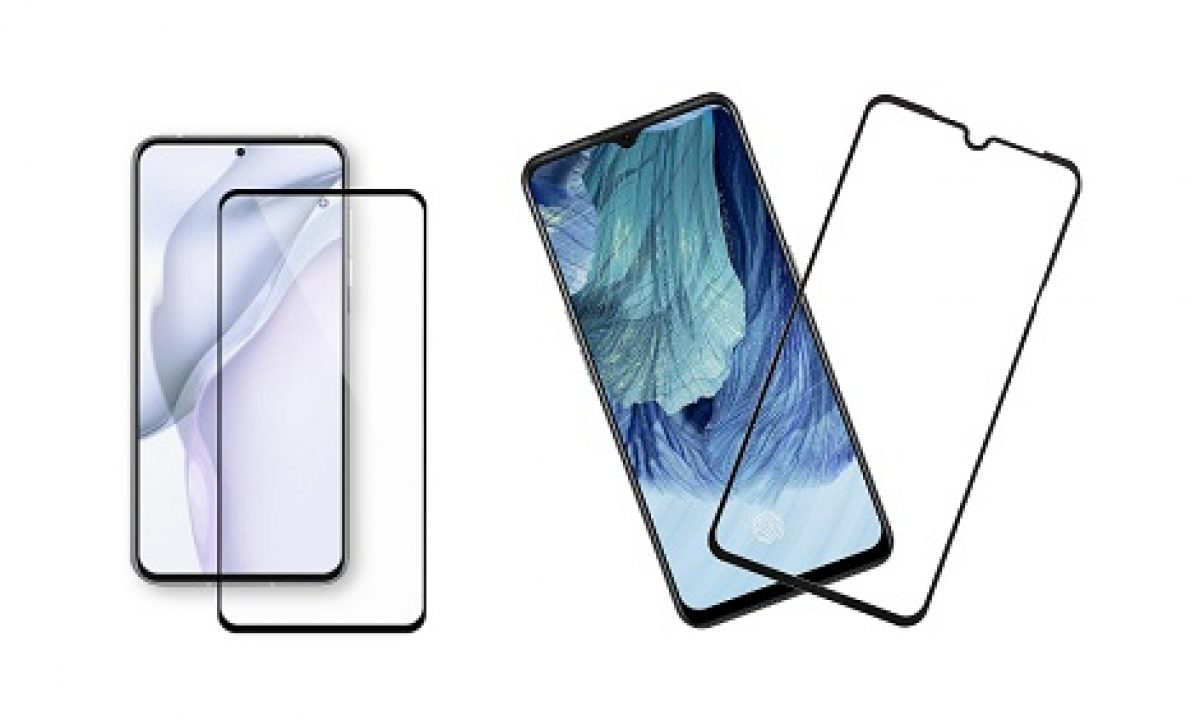
NEW DELHI: Domestic contract manufacturer Optiemus Infracom has entered into a joint venture with US-based speciality glassmaker Corning International to set up India’s first manufacturing facility for producing high-quality finished cover glass parts for the mobile consumer electronics industry.
The collaboration between both the companies will help expand India’s electronics manufacturing ecosystem, as the Indian government strengthens its Make in India initiative. As a part of the joint venture, the companies strategically aim to set up a world-class manufacturing facility in India, powered by cutting-edge technologies and processes.
Driven by a shared commitment to innovation and technological excellence, this collaboration will pave the way for the manufacturing of “Made in India” finished cover glass parts for use in mobile consumer electronic devices, and other cover glass applications, to meet the needs of next-generation mobile consumer electronic devices.
The joint venture signifies a powerful synergy between Optiemus’s deep domestic industry and manufacturing knowledge of electronics and telecom market and Corning’s globally-acclaimed expertise in advanced glass technology. By combining these strengths, the joint venture aspires to not only establish cover glass manufacturing capabilities and capacity in India, but also to contribute significantly to the creation of jobs and skill development within India’s thriving technology sector, the companies said in a statement.
Ashok Kumar Gupta, Chairman, Optiemus Infracom, said, “It is a matter of great pride for us to actively contribute to the growing manufacturing ecosystem in the country. With this joint venture, initiated in line with the vision of Hon’ble Prime Minister of India of ‘Make in India’ programme and the “Atmanirbhar Bharat” initiative, we are committed to make available world-class high-quality products for global and local brands.”
“Embarking on this new journey, we intend to emerge as one of the top manufacturers of finished cover glass parts for use in mobile consumer electronic devices in the next five years. Our collective expertise in innovation, design, and manufacturing, will provide holistic solutions for the brands,” Gupta added.
5g
MediaTek Catch-up with Tech: Infinix Zero 30 5G with Dimensity 8020 launched
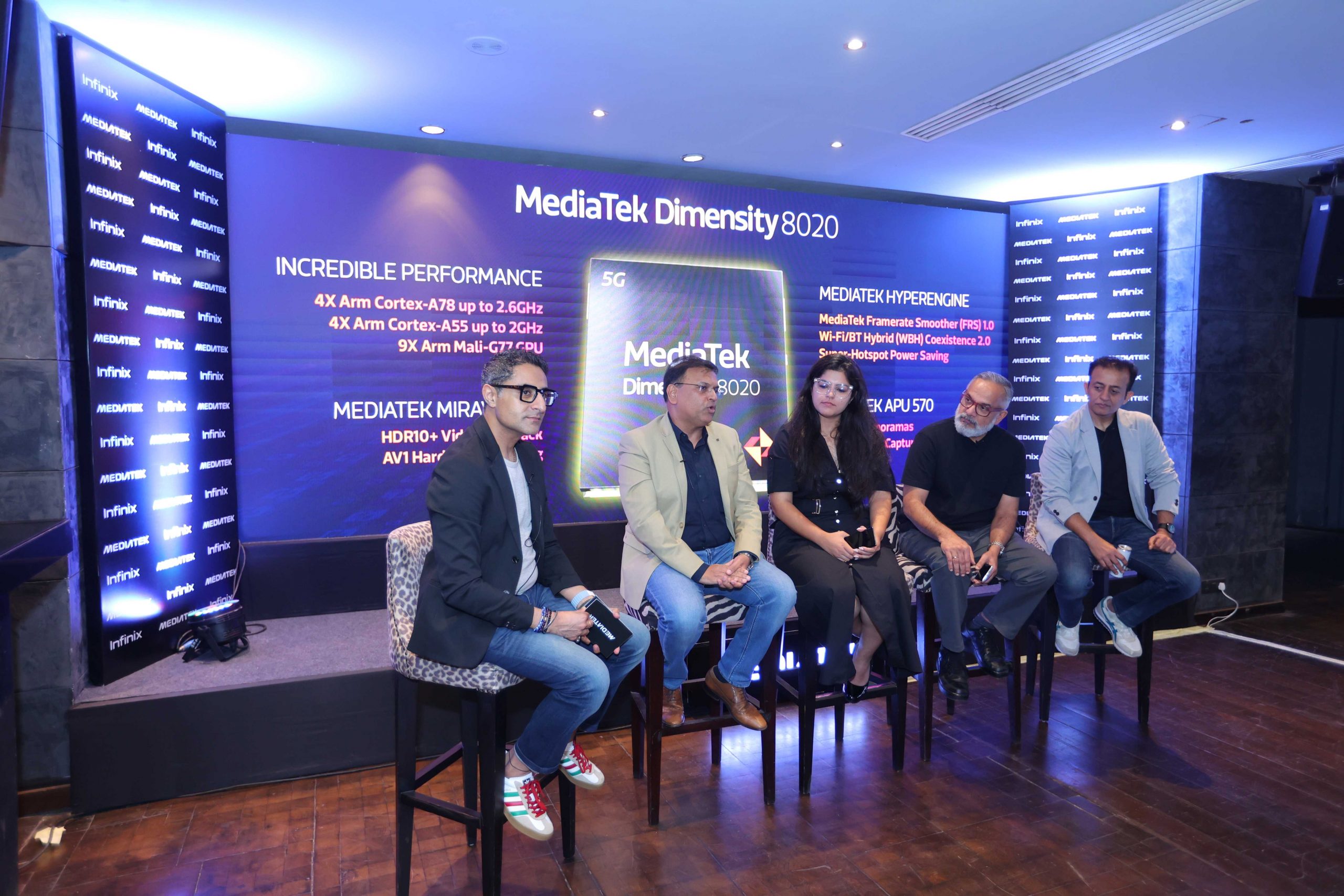
NEW DELHI: Chipset maker MediaTek, which claims to power more than two billion connected devices every year, hosted ‘Catch-up with Tech’ in collaboration with handset brand Infinix on August 28 to share insightful and engaging conversations about the new-age smartphones and innovative technologies powering everyday lives.
The meet-up threw the spotlight on the MediaTek Dimensity Auto, Satellite solutions and Generative AI along with an extensive showcase of newly-launched Infinix Zero 30 5G powered by MediaTek Dimensity 8020, Infinix GT 10 Pro powered by MediaTek Dimensity 8050, and Infinix QLED TV powered by MediaTek.
In terms of specs, the Infinix Zero 30 5G is tailored for young storytellers and creators, featuring the first-ever smartphone to deliver 4K 60fps video recording from its 108 MP OIS rear camera and ultra-high resolution 50MP front camera. The Zero 30 series powered by MediaTek Dimensity 8020 is said to be a game changer for the front camera vlogging experience along with being the slimmest curved AMOLED smartphone in the segment with glass and a vegan leather back panel. It also claims to be one of the most premium-looking devices in the segment.
The event witnessed a panel discussion moderated by Anuj Sidharth, Deputy Director Marketing & Corporate Communications, MediaTek and included expert panelists from Infinix, MediaTek and two renowned professional photographers.
“With the fifth edition of Catch-up with Tech, we aim to bring consumers closer to the technology and enable them to make informed buying decisions based on their diverse needs. In collaboration with Infinix, this meet-up is in-line with MediaTek’s vision of technology democratization and making innovative technology accessible to everyone,” said Anku Jain, Managing Director, MediaTek India. “The MediaTek Dimensity 8020 in Infinix Zero 30 5G brings faster displays, brilliant cameras and ultra-fast performance. Further, MediaTek Imagiq technologies enrich the capture experience by combining dedicated AI, imaging processors and accelerators to provide incredible results,” he added.
Anish Kapoor, CEO, Infinix Mobile India, said, “Featuring India’s first 50MP 4K 60 fps video recording, Infinix Zero 30 5G is primed to redefine smartphone imaging capabilities, setting a new standard for the creators and vlogging enthusiasts. Our collaboration with MediaTek has played a pivotal role in shaping our exceptional smartphone portfolio, and the Zero 30 5G stands as evidence of our unwavering commitment to innovation and delivering unmatched experiences to our users. The display and design of the device represent a leap forward in smartphone technology. As Infinix Zero 30 5G hits the shelves, we are positive that our customers will find this new offering as exhilarating as we do, further empowering creators to capture their story like never before.”
Radhakrishnan Chakyat, a photography evangelist, founder and host of Pixel Viilage, said, “Infinix Zero 30 5G smartphone powered by MediaTek Dimensity 8020 chipset has amazing hardware features, an excellent camera, dual-view video mode and is primed for optimal content creation and saves a tremendous amount of editing time.”
Aarzoo Khurana, a wildlife photographer, said, “Over the last few days, I clicked various pictures and recorded a few videos with the newly-launched Infinix Zero 30 5G powered by MediaTek Dimensity 8020, and the experience has been truly inspiring. Infinix’s smartphone’s OIS feature helps content creators click shake-free pictures and the front camera, which is extremely sharp and detailed, enables content creators to click countless selfies.”



